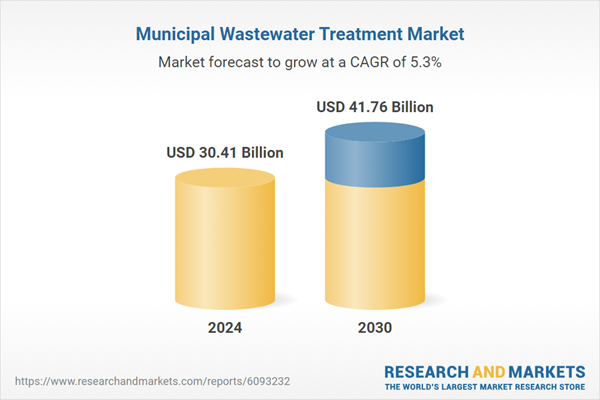Speak directly to the analyst to clarify any post sales queries you may have.
10% Free customizationThis report comes with 10% free customization, enabling you to add data that meets your specific business needs.
Governments are adopting advanced technologies such as membrane bioreactors (MBRs), UV disinfection, and advanced oxidation processes (AOPs) to comply with strict environmental standards. Simultaneously, climate-driven water scarcity is prompting a shift toward water recycling and reuse strategies. As digitalization spreads, smart sensors, IoT, and AI-based systems are revolutionizing operations by improving plant performance, monitoring, and regulatory compliance. These factors collectively underpin the market’s dynamic expansion.
Key Market Drivers
Rising Urban Population and Expanding Municipal Infrastructure
The increasing urban population is exerting pressure on existing wastewater systems, driving the need for expanded and modernized municipal treatment infrastructure. According to the United Nations, urban residents accounted for 56.2% of the global population in 2023 - a number projected to reach 68% by 2050. This urban influx leads to greater sewage volumes, compelling municipal authorities to invest in new treatment facilities and network upgrades. In developing regions, like India, where treatment capacity covers only about 38% of daily sewage generation, the demand for wastewater solutions is critical. Simultaneously, older infrastructure in developed nations, such as the U.S. and Germany, requires significant rehabilitation to meet rising volumes and compliance standards. These combined pressures are propelling investments in municipal wastewater management on a global scale.Key Market Challenges
High Capital and Operational Costs
One of the main constraints in municipal wastewater treatment is the high cost associated with plant development and ongoing operations. Constructing full-scale treatment plants involves significant expenditure on civil works, mechanical installations, and control systems - often amounting to millions of dollars. Furthermore, operating expenses, particularly for energy and chemical usage, can account for a large portion of annual budgets, with energy alone representing up to 40%. These costs are especially challenging in low- and middle-income countries where financial resources are limited and electricity prices are high. Many municipalities lack access to adequate funding, and retrofitting outdated systems to meet modern regulatory requirements further exacerbates the financial burden. Smaller municipalities face additional economic pressure due to their limited scale, making per-unit treatment costs disproportionately high.Key Market Trends
Integration of Smart Water Technologies and IoT in Wastewater Management
The adoption of smart technologies is transforming municipal wastewater operations, improving efficiency, reliability, and compliance. Utilities are incorporating IoT sensors, SCADA systems, and cloud-based platforms to monitor water quality, energy use, and plant performance in real-time. These tools enable predictive maintenance and early detection of operational issues, significantly reducing downtime and repair costs. Predictive analytics further enhances decision-making by forecasting equipment failures and optimizing treatment processes. Digital twins are also emerging as valuable tools, simulating plant operations under various conditions to support design and performance optimization. These innovations are enabling municipalities to build more resilient and cost-effective wastewater treatment systems.Accelerated Emphasis on Water Reuse and Circular Economy
The global shift toward sustainable resource use is placing emphasis on water reuse and circular economy principles in municipal wastewater treatment. Cities are increasingly adopting systems that recycle treated wastewater for non-potable purposes such as irrigation, industrial cooling, and toilet flushing. In regions facing water scarcity, such as the Middle East, Singapore, and California, advanced technologies are even enabling indirect or direct potable reuse. Circular models also include recovering energy from sludge digestion and extracting nutrients like phosphorus for fertilizer production. These practices not only reduce environmental impact but also create new revenue opportunities and improve the economic viability of wastewater treatment investments. As global focus intensifies on sustainability, these approaches are expected to become integral to municipal wastewater strategies.Key Market Players
- Veolia Water Technologies
- SUEZ Water Technologies & Solutions
- Xylem Inc.
- Ecolab Inc.
- Evoqua Water Technologies LLC
- DuPont Water Solutions
- Kurita Water Industries Ltd.
- Aquatech International LLC
- Pentair plc
- Fluence Corporation
Report Scope:
In this report, the Global Municipal Wastewater Treatment Market has been segmented into the following categories, in addition to the industry trends which have also been detailed below:Municipal Wastewater Treatment Market, By Treatment Process:
- Physical Treatment
- Chemical Treatment
- Biological Treatment
- Membrane-Based Treatment
- Others
Municipal Wastewater Treatment Market, By Application:
- Residential
- Commercial
- Others
Municipal Wastewater Treatment Market, By Treatment Technology:
- Primary Treatment
- Secondary Treatment
- Tertiary Treatment
Municipal Wastewater Treatment Market, By Region:
- North America
- United States
- Canada
- Mexico
- Europe
- Germany
- France
- United Kingdom
- Italy
- Spain
- South America
- Brazil
- Argentina
- Colombia
- Asia-Pacific
- China
- India
- Japan
- South Korea
- Australia
- Middle East & Africa
- Saudi Arabia
- UAE
- South Africa
Competitive Landscape
Company Profiles: Detailed analysis of the major companies present in the Global Municipal Wastewater Treatment Market.Available Customizations:
With the given market data, the publisher offers customizations according to a company's specific needs. The following customization options are available for the report.Company Information
- Detailed analysis and profiling of additional market players (up to five).
This product will be delivered within 1-3 business days.
Table of Contents
Companies Mentioned
- Veolia Water Technologies
- SUEZ Water Technologies & Solutions
- Xylem Inc.
- Ecolab Inc.
- Evoqua Water Technologies LLC
- DuPont Water Solutions
- Kurita Water Industries Ltd.
- Aquatech International LLC
- Pentair plc
- Fluence Corporation
Table Information
| Report Attribute | Details |
|---|---|
| No. of Pages | 185 |
| Published | June 2025 |
| Forecast Period | 2024 - 2030 |
| Estimated Market Value ( USD | $ 30.41 Billion |
| Forecasted Market Value ( USD | $ 41.76 Billion |
| Compound Annual Growth Rate | 5.2% |
| Regions Covered | Global |
| No. of Companies Mentioned | 10 |









